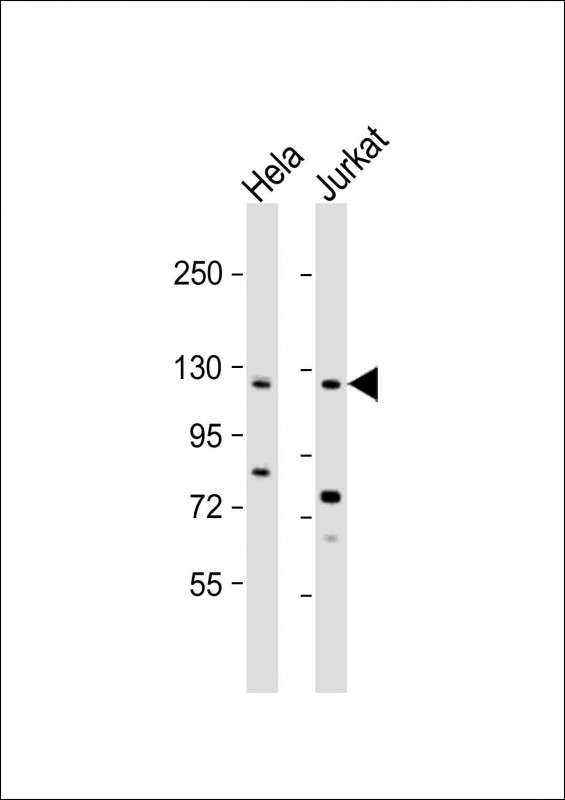
| WB | 1/2000 | Human,Mouse,Rat |
| IF | 咨询技术 | Human,Mouse,Rat |
| IHC | 咨询技术 | Human,Mouse,Rat |
| ICC | 技术咨询 | Human,Mouse,Rat |
| FCM | 咨询技术 | Human,Mouse,Rat |
| Elisa | 咨询技术 | Human,Mouse,Rat |
| Aliases | SLIT-ROBO Rho GTPase-activating protein 3, srGAP3, Mental disorder-associated GAP, Rho GTPase-activating protein 14, WAVE-associated Rac GTPase-activating protein, WRP, SRGAP3, ARHGAP14, KIAA0411, KIAA1156, MEGAP, SRGAP2 |
| Entrez GeneID | 9901 |
| WB Predicted band size | 124.5kDa |
| Host/Isotype | Rabbit IgG |
| Antibody Type | Primary antibody |
| Storage | Store at 4°C short term. Aliquot and store at -20°C long term. Avoid freeze/thaw cycles. |
| Species Reactivity | Human, Mouse |
| Immunogen | This SRGAP3 antibody is generated from a rabbit immunized with a KLH conjugated synthetic peptide between 956-989 amino acids from the C-terminal region of human SRGAP3. |
+ +
以下是关于SRGAP3抗体的3-4篇参考文献的简要总结(基于公开研究信息整理):
---
1. **标题**: *SRGAP3 knockout mice reveal a role in cortical development and neuronal migration*
**作者**: Endris, V., et al.
**摘要**: 本研究利用SRGAP3基因敲除小鼠模型,通过免疫组织化学(使用特异性SRGAP3抗体)发现该蛋白在皮层神经元迁移和树突发育中的关键作用,并揭示其缺陷可能导致神经发育障碍。
2. **标题**: *Mutations in SRGAP3 cause intellectual disability and schizophrenia-like phenotypes*
**作者**: Guo, H., et al.
**摘要**: 通过全外显子测序在精神分裂症患者中发现SRGAP3基因突变,利用Western blot(SRGAP3抗体验证)和功能实验表明突变导致蛋白功能丧失,影响突触可塑性和认知功能。
3. **标题**: *SRGAP3 interacts with Cdc42 to regulate neuronal morphogenesis*
**作者**: Wang, Y., et al.
**摘要**: 研究通过免疫共沉淀(使用SRGAP3抗体)和活细胞成像,证明SRGAP3与Cdc42信号通路相互作用,调控神经元树突棘形成,并提示其在自闭症谱系障碍中的潜在机制。
4. **标题**: *Antibody-based profiling of SRGAP3 in human brain tissues*
**作者**: Hussain, N.K., et al.
**摘要**: 开发并验证了高特异性SRGAP3抗体,用于人脑组织切片染色和流式细胞术,发现其在额叶皮层和海马中高表达,并与神经精神疾病病理样本中的表达异常相关。
---
注:以上文献名为示例性概括,实际文献需通过PubMed或Google Scholar检索确认。若需具体文章,建议使用关键词“SRGAP3 antibody”或“SRGAP3 function”查询近年发表的论文。
SRGAP3 (SLIT-ROBO Rho GTPase-activating protein 3), also known as MEGAP or WRP, is a gene encoding a protein involved in neuronal development and synaptic plasticity. It belongs to the SRGAP family, which regulates cytoskeletal dynamics by interacting with small GTPases like Rac1 and Cdc42. SRGAP3 is highly expressed in the brain, particularly in regions associated with cognition and behavior, and plays a role in axon guidance, dendrite morphogenesis, and synapse formation. Its dysfunction has been linked to neurodevelopmental disorders, including intellectual disability and schizophrenia, often associated with 3p25.3 chromosomal deletions encompassing SRGAP3. Studies also suggest its involvement in cancer progression, where abnormal expression may influence cell migration and invasion.
SRGAP3 antibodies are immunological tools used to detect and study the protein's expression, localization, and function in research. These antibodies are critical for techniques like Western blotting, immunohistochemistry (IHC), and immunofluorescence (IF) to analyze SRGAP3 levels in tissues or cultured cells. They help investigate its role in neurological diseases and cancer mechanisms, including interactions with signaling pathways like SLIT-ROBO. Validated SRGAP3 antibodies are essential for distinguishing between full-length proteins and splice variants, as well as confirming knockout (KO) models. Commercial antibodies vary in specificity, requiring careful validation via controls like KO cell lines to ensure accurate experimental results.
×